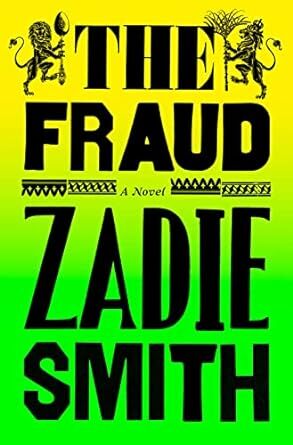The Fraud, by Zadie Smith

Absolute literary powerhouse Zadie Smith takes on historical fiction with a novel about a nineteenth-century legal case, a failed novelist, and a woman who, like many Victorian women, wants more from life than her society offers a woman of her station.
At the heart of the novel is the Tichborne case which fascinated 1870s England, in which an apparently working-class Englishman who had emigrated to Australia returned to England claiming to be the long-lost heir of a wealthy family. Among the many people intrigued by this case is the novel’s main character, Eliza Touchet. Eliza is the cousin of a prolific but not very successful novelist named William Harrison Ainsworth (a real 19th century writer I had never heard of, and the many summaries of Ainsworth’s books in this story make it clear why I never have). While attending the Tichborne trial with Ainsworth’s wife, Eliza is most fascinated not with “The Claimant” himself, but with one of the family servants who loyally and consistently supported his claim to be the missing heir: a Black servant original from Jamaica called Andrew Bogle.
There is, to put in mildly, a lot happening in The Fraud. There’s Eliza’s own story of genteel disappointment and frustrated ambition, a common enough one in any story about a woman in Victorian England, but it’s spiced up by memories of her sexual adventures with both Ainsworth and his first wife. There’s the up-and-down tale, told through Eliza’s eyes and almost mostly in flashbacks (lot of jumping around in the timeline here) of Ainsworth’s literary career and his feuds and jealousies with other writers (cameos by Dickens and many others). In the present-day timeline of the story, there’s the Tichborne trial itself, and the fascinating ways in which it divides English society and plays on class distinctions and resentments. Then there’s a very long section in which Eliza sits down to talk to Bogle and learn his story: the scene shifts to Jamaica and we get a whole other novel-within-the-novel about Bogle’s family and his early life — this part felt to me almost like a different book, very reminiscent of Andrea Levy’s The Long Song or Esi Edugyan’s Washington Black in its exploration of the years immediately before and after the ending of slavery in British colonies.
It’s an ambitious novel, and I’m not sure every ambition is realized — I believe the author sees threads tying all these storylines together that weren’t entirely apparent to me, and while Eliza is a great character through whose eyes watch all these stories unfolding, I was never entirely sure what Eliza herself wanted. The Tichborne Claimant is the obvious “fraud” of the title, but there’s much more playing around with ideas of fraud, identity, and selfhood as well. While I didn’t entirely feel like everything came together the way I as a reader wanted it to, reading this book was a thoroughly fascinating experience, and I can’t help but admire the vast reach and scope of Smith’s storytelling here.



